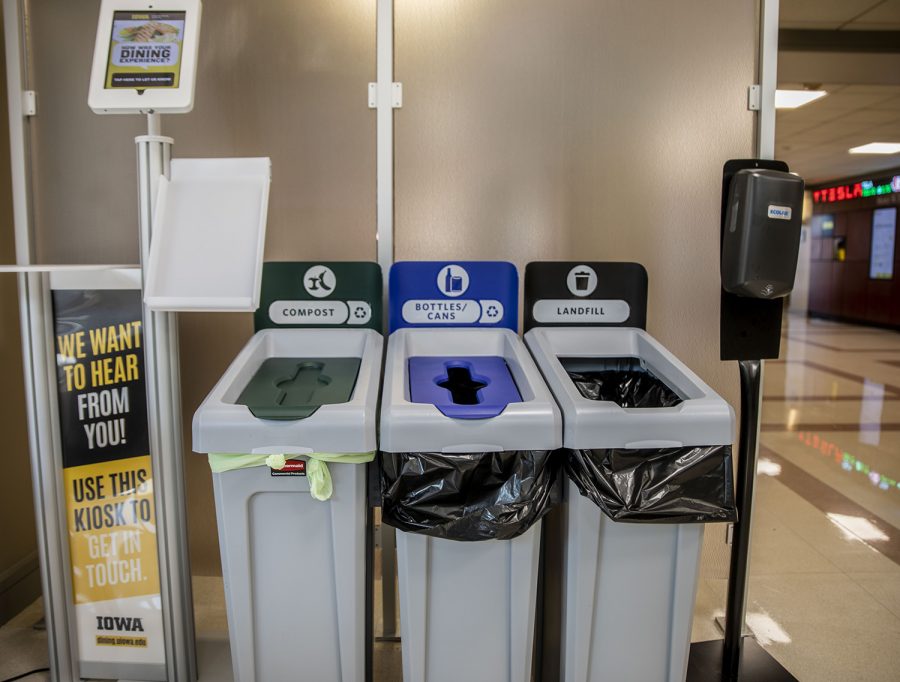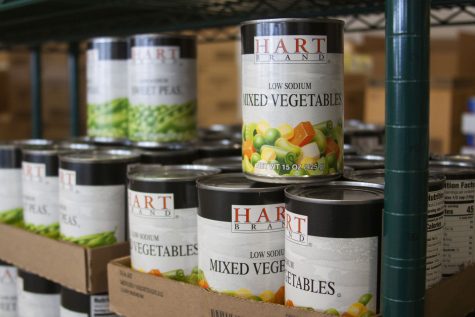Opinion | UI students should start composting
Students need to start taking advantage of university-provided composting services in order to reduce waste while helping the local and global environment.
A new green compost bin is seen on Monday, Aug. 30, 2021. The new bin can be found in Pat’s Diner which is located in the Tippie College of Business building. (Jeff Sigmund/Daily Iowan)
September 23, 2021
Do you live in the dorms at the University of Iowa? Do you sometimes have leftover food scraps after a meal? And do you have crippling climate anxiety that reminds you as Earth’s temperatures rise every year, so does your negative impact on the environment? Well, a university-provided compost bin might be the solution for you.
In all seriousness, the University of Iowa’s Office of Sustainability and the Environment and Housing and Dining Services teamed up in 2018 to create an easy and accessible composting infrastructure for residence halls. But these services aren’t being used enough.
Through compositing, students can learn the importance of waste reduction and help communities, the environment, and themselves.
In an email to the Daily Iowan, Beth MacKenzie, sustainability program manager at the Office of Sustainability and the Environment, described the program’s history of enrollment.
When the composting program began in 2018, 117 students signed up for compost bins for themselves and 98 roommates, totaling 215 students actively trying to reduce their ecological footprint. In 2019, a total of 210 students participated in the program.
In 2020, however, sustainable dormitory consciousness was halted, much like most other aspects of life during this time due to COVID-19.
“Due to Covid, the residence hall staff were tasked with many new and extra responsibilities to keep students safe and healthy,” MacKenzie wrote. “So, the program partners, which include the Office of Sustainability and the Environment and Housing and Dining, agreed to postpone the program launch until mid-semester to allow residence hall staff to settle into their new routine.”
However, after the lockdown year, the return of the normal composting rollout has not been entirely successful. MacKenzie wrote that there are only 103 students and 86 roommates, which makes 189 participants in total so far this semester. Despite the disappointment that 2021’s composting enrollment is 26 students short of 2018’s record, the real tragedy is that there are over 1,000 bins available for the program that could serve well over 1,000 students at once.
Yet, we are currently only using 103 of the 1,000 available compost bins.
Despite current low enrollment numbers, the composting program holds great potential to make a positive difference in the effort to reduce waste responsibly.
The main goal for composting is to keep landfills free of food or organic matter.
“When organic materials break down in an anaerobic environment like a landfill, they produce methane which is a powerful greenhouse gas, but when those same materials break down in an aerobic environment, like a compost pile, those methane emissions are greatly reduced,” MacKenzie wrote.
Methane is a silent killer of the Earth’s atmosphere. As methane is emitted, the Earth’s ability to allow heat escape from the atmosphere to space reduces. The gas traps heat in, warming the Earth’s surface. This phenomenon, referred to as the Greenhouse Effect, is responsible for contributing to many negative effects of climate change.
We need to take individual steps toward reducing methane emissions, and students can do this by starting their compost journey through the university’s composting program.
As a student, composting can provide multiple benefits outside of environmental improvements.
Learning how to compost waste gives an opportunity to truly consider how much individuals misuse certain products. Having this knowledge can lead to an altered shopping or eating routine, reduction of waste, and cost cutbacks from no longer purchasing unused products.
When a student’s bin is collected, their compost is processed at the Iowa City Landfill’s compost facility. After a period of time dedicated to the breaking down of food materials by bugs, fungi, and other decomposers, the compost is operational and ready to return nutrients back to the soil.
“After the materials have broken down into usable compost, the City of Iowa City offers it to residents for their use in their lawns and gardens,” MacKenzie wrote.
The compost materials dispersed around Iowa City are nutrient-packed, chemical-free, and act as a plant superfood. In composting, students can essentially experience improvements in their local environment’s aesthetic, air quality, and quality of living from their own compost bin.
Composting can also help to reduce a student’s anxiety regarding the environment. With the regular occurrences of climate disasters and disheartening environmental updates, it’s easy to feel discouraged or uneasy regarding the planet. Knowing that you are doing what you can to combat the negative effects of climate change can give peace, or at least ease some anxieties.
So, don’t let such easy and impactful resources like the university-provided composting infrastructure go to waste. This is your moment to reduce methane. Take advantage of this opportunity to aid in the climate fight and start composting.
Columns reflect the opinions of the authors and are not necessarily those of the Editorial Board, The Daily Iowan, or other organizations in which the author may be involved.













